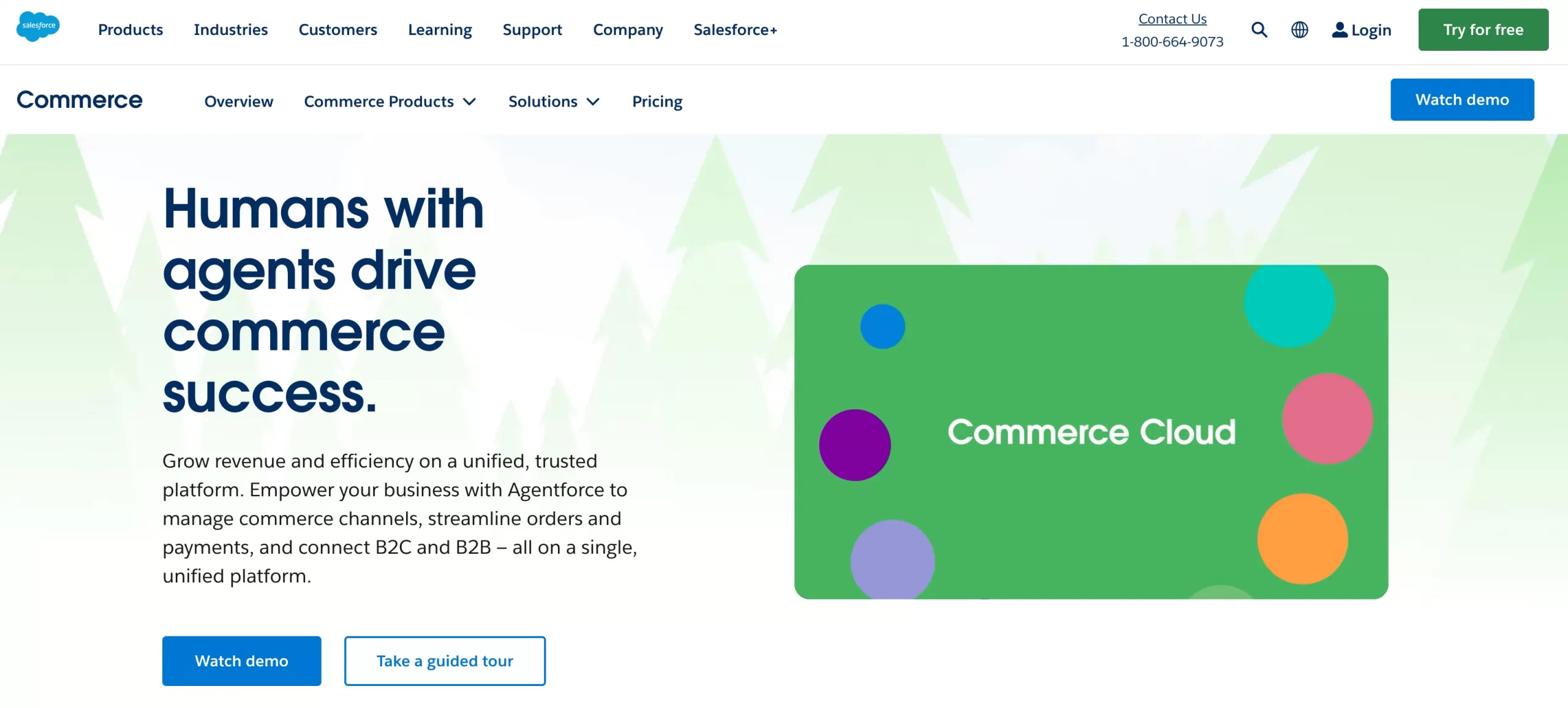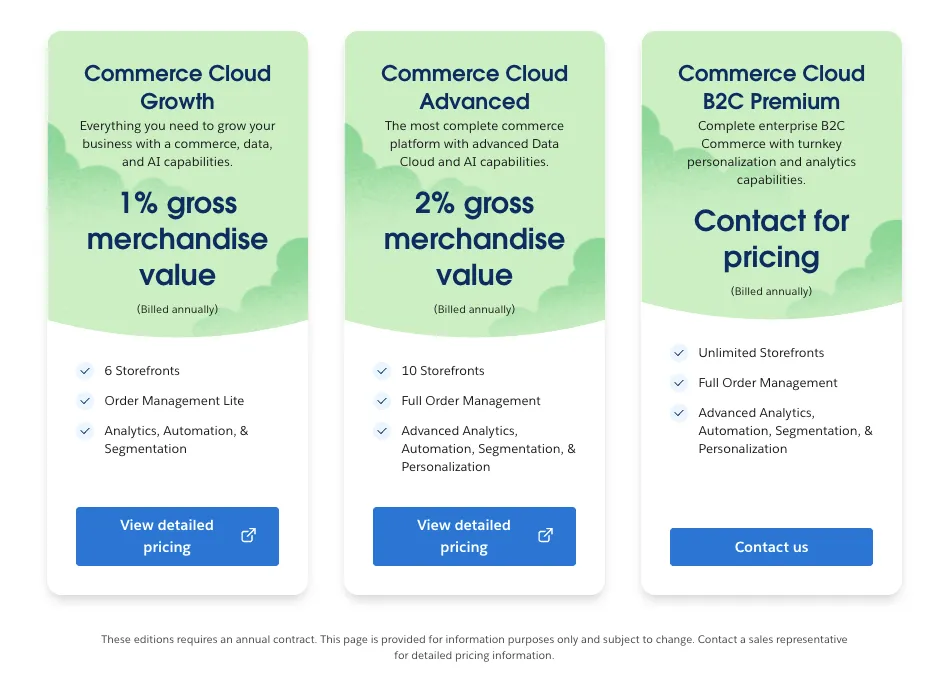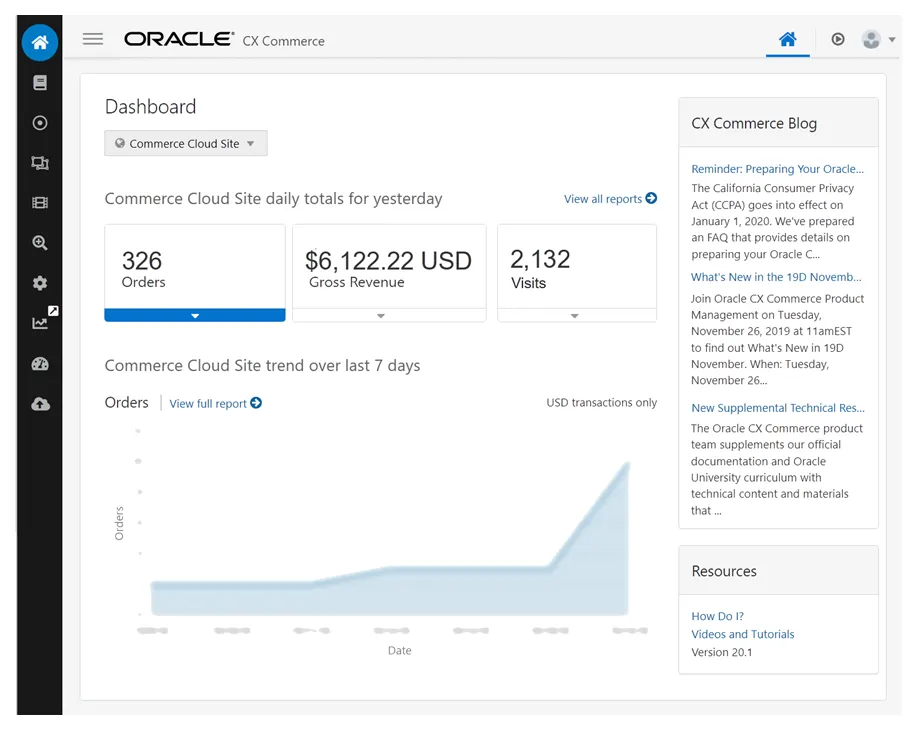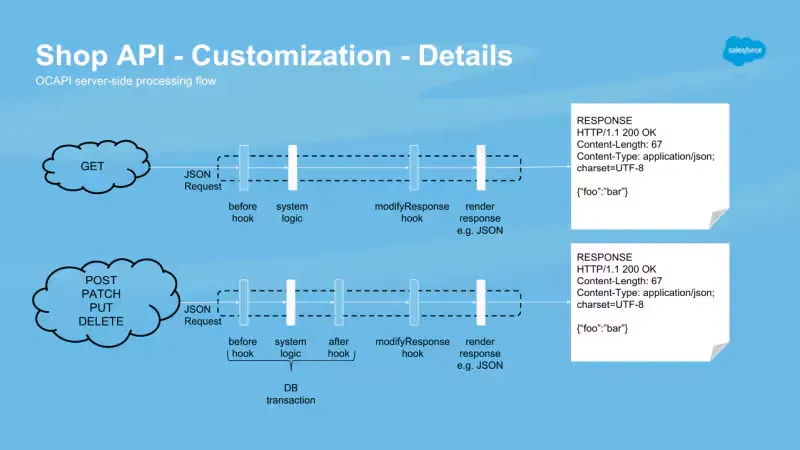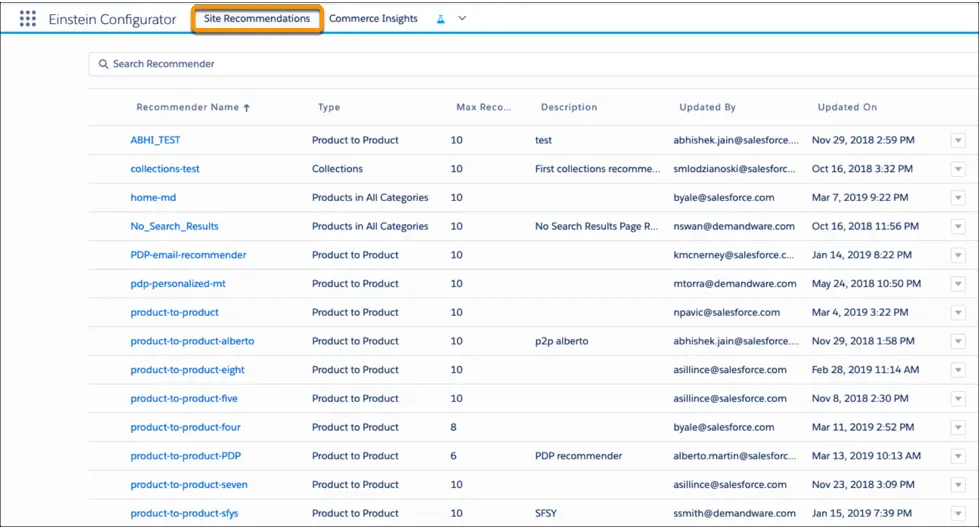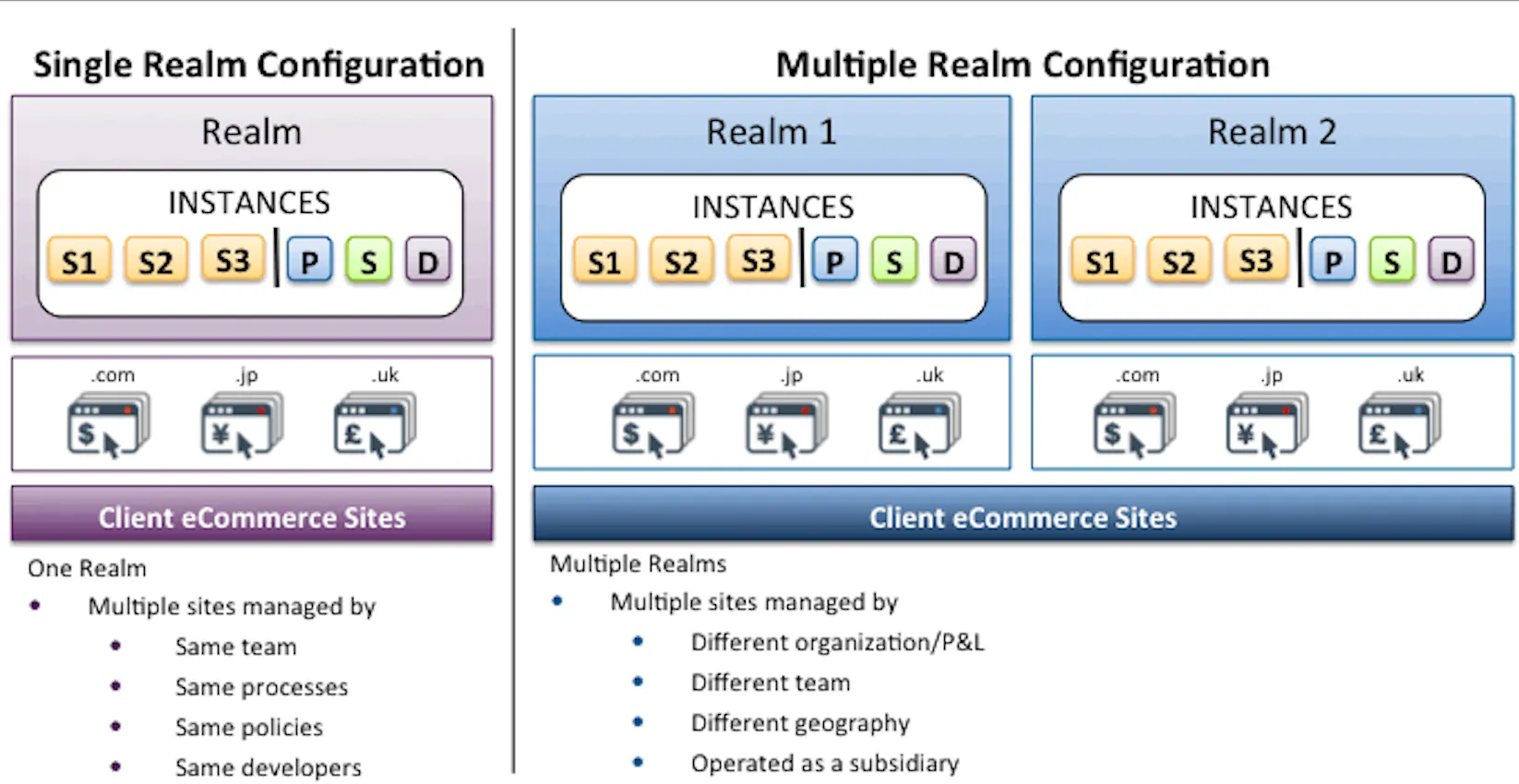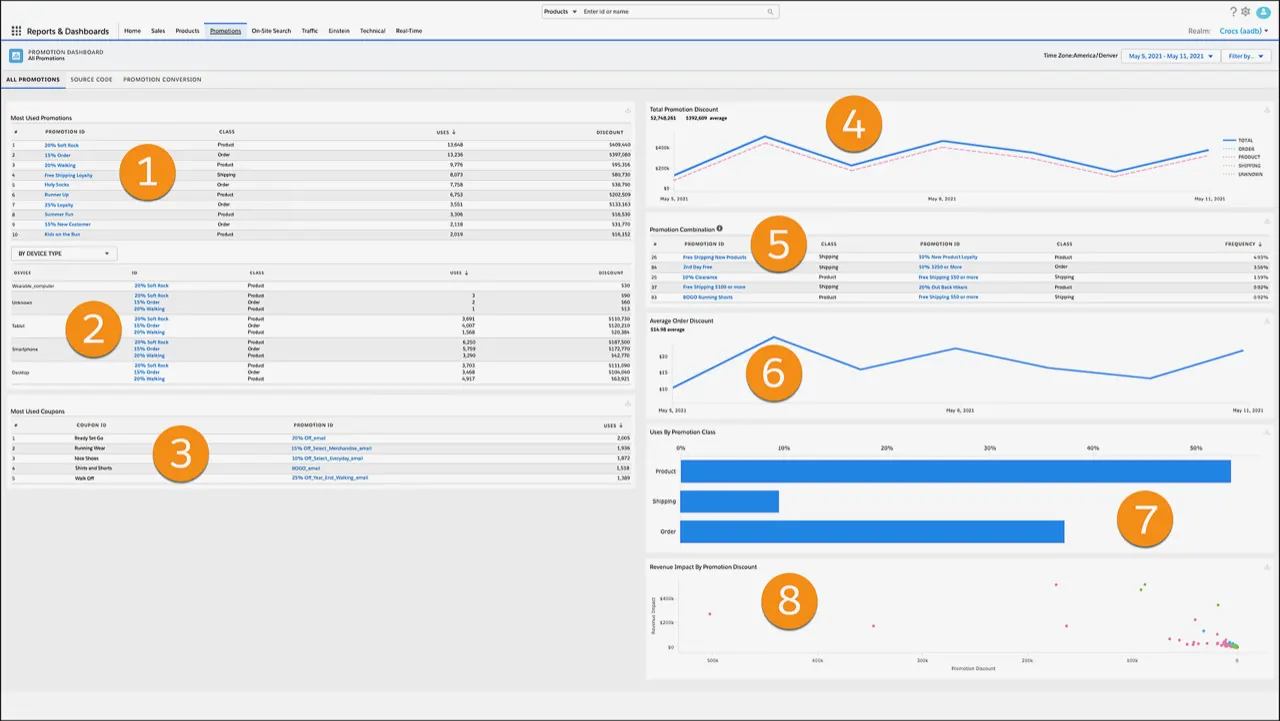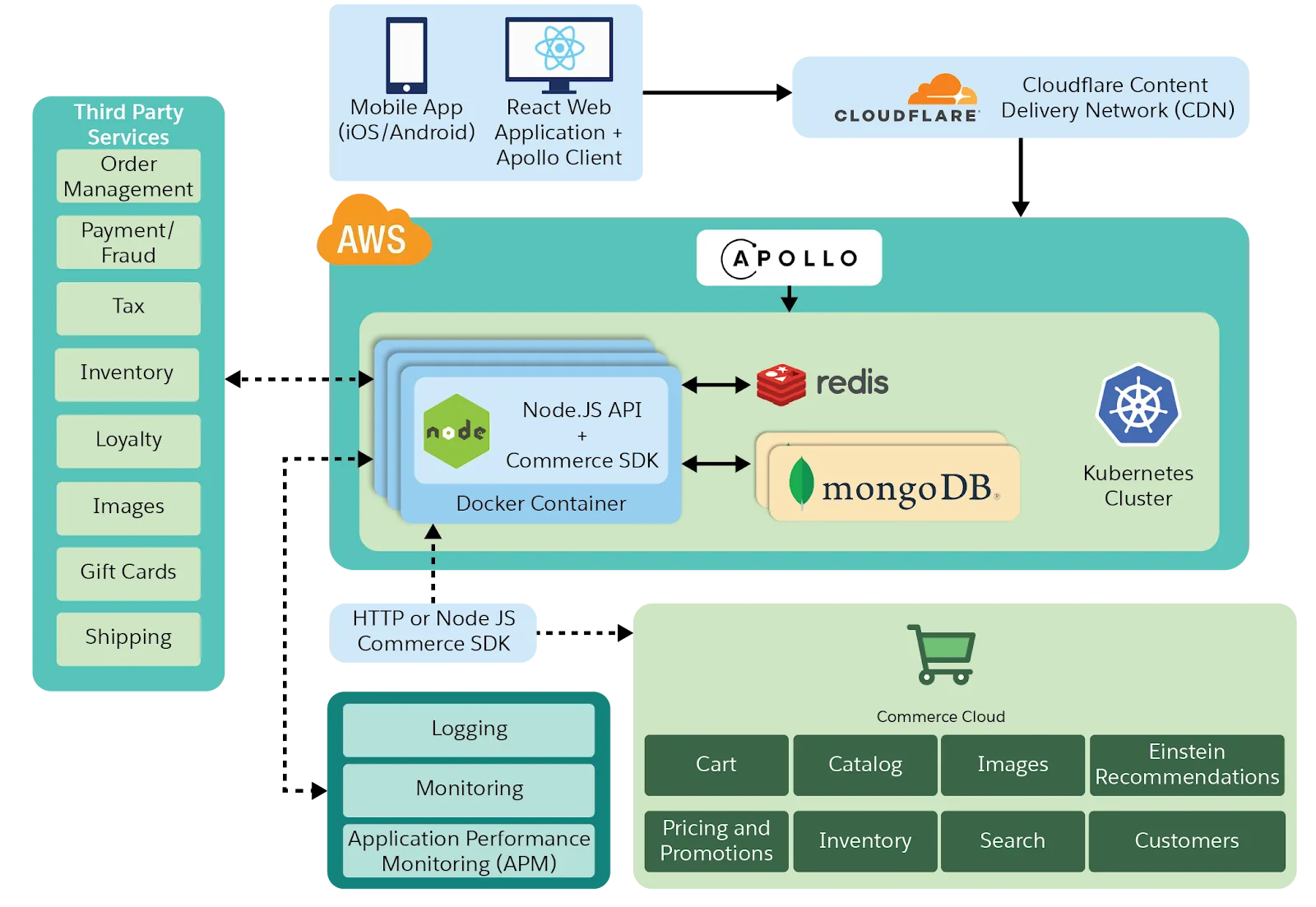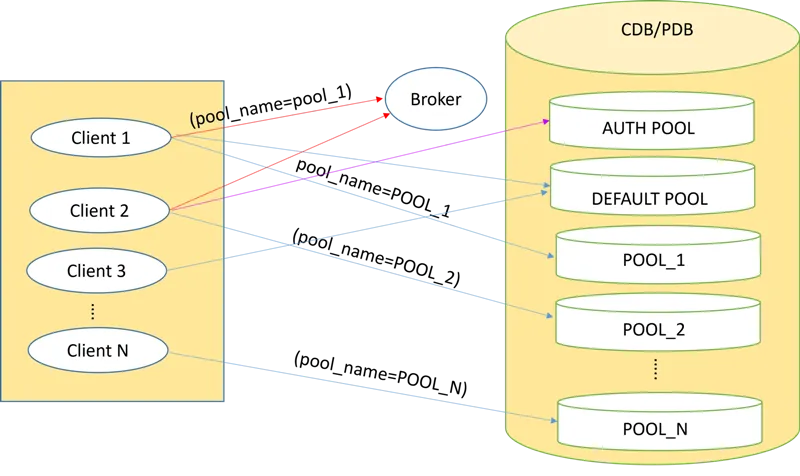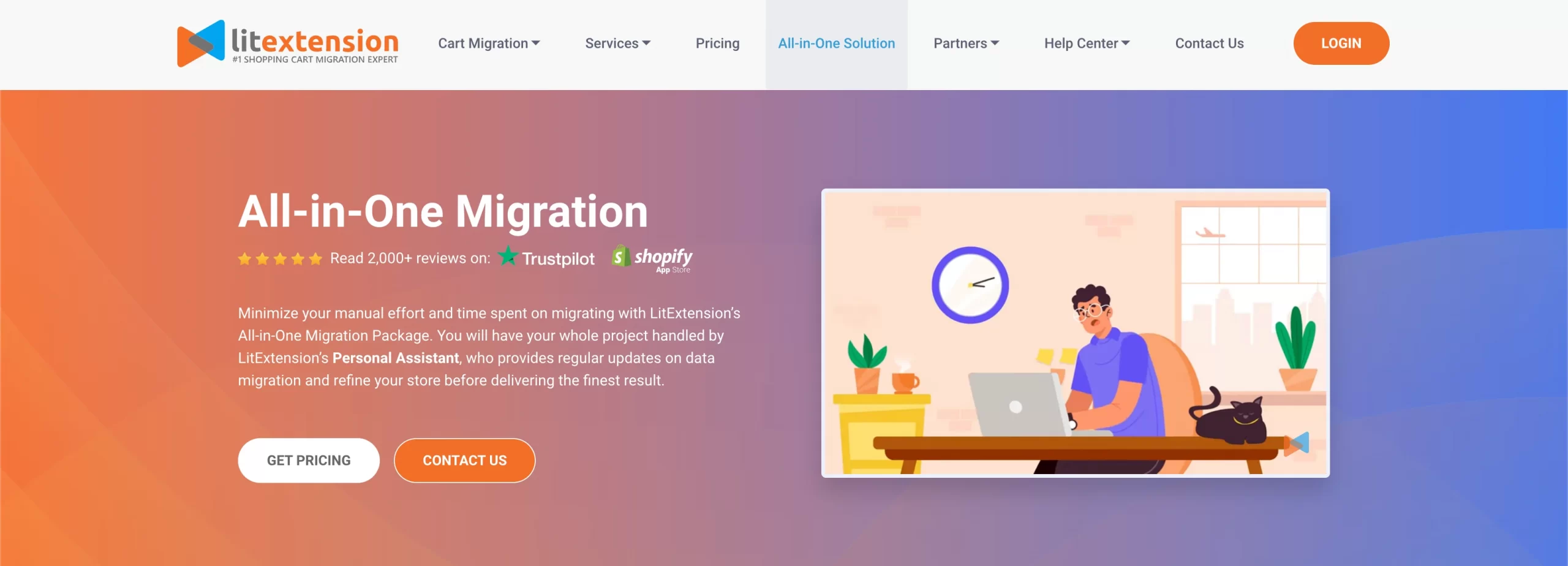Choosing the right enterprise commerce platform in 2025 requires a clear understanding of how each solution aligns with your business architecture, technical capacity, and growth goals. Salesforce Commerce Cloud vs Oracle Commerce (including both Oracle Commerce Cloud and legacy ATG) offer robust capabilities but follow fundamentally different models in terms of integration, usability, and long-term scalability.
Salesforce excels in seamless connectivity and managed services, while Oracle Commerce appeals to organizations that need deeper infrastructure control or an existing Oracle alignment. This guide helps decision-makers evaluate which path leads to greater efficiency, resilience, and digital commerce success in 2025.
Salesforce and Oracle Commerce Platforms Explained
What is Salesforce Commerce Cloud?
Salesforce Commerce Cloud is a cloud-based eCommerce platform that’s part of the broader Salesforce ecosystem. It’s divided into two core offerings:
- B2C Commerce (formerly Demandware): Built for retail and direct-to-consumer brands, this version emphasizes fast time-to-market, AI-driven personalization (via Einstein), and seamless integration with Salesforce CRM, Service Cloud, and Marketing Cloud.
- B2B Commerce: Designed for complex sales processes, Salesforce B2B Commerce offers features like account-based pricing, custom catalogs, and multi-tiered approval workflows. It suits manufacturers, wholesalers, and distributors managing high-volume, negotiated orders.
Both offerings benefit from Salesforce’s ecosystem, scalability, and consistent cloud delivery, though they’re architecturally and functionally distinct products.
What is Oracle Commerce Cloud, and what happened to ATG/Endeca?
Oracle Commerce Cloud (OCC) is Oracle’s SaaS evolution of its legacy Oracle Commerce platform, which was originally built on ATG (Application Server Framework) and Endeca (Search & Navigation) technologies. While ATG was widely used in B2B and highly customized enterprise setups, it has since fallen behind in cloud agility and modern architecture.
Oracle Commerce Cloud aims to provide a more agile, extensible platform with support for both B2C and B2B models, integrating closely with Oracle’s broader cloud ecosystem (ERP, SCM, CX). However, adoption has been limited compared to competitors like Salesforce and Adobe Commerce.
As of 2025, Oracle Commerce (ATG) is no longer actively developed, and support is limited, pushing many enterprise users to consider migration away from the platform.
Key Differences Between Salesforce Commerce Cloud vs Oracle Commerce
Before going to the detailed comparison, here is a quick table summarizing all important and key information of both Salesforce Commerce Cloud vs Oracle Commerce.
Category | Salesforce Commerce Cloud | Oracle Commerce (OCC + ATG) |
GMV-based (1–3%); mid-to-large builds: $300K–$500K avg; includes hosting and updates. Add-ons like Einstein AI priced separately. | OCC: Subscription model (page views/orders); $250K–$600K+ typical. ATG: License-based; $500K–$1M+ yearly with infra/upgrade. OCC has hidden costs with customization/support. | |
Intuitive Business Manager; strong for non-tech users; CRM ecosystem integration. Separate UIs for B2B/B2C. | OCC: Improved admin UI with drag-and-drop tools. ATG: Developer-heavy, less accessible for business users. | |
Structured extensibility; uses ISML, PWA Kit, APIs. Seamless within Salesforce. Custom setups may need partners. | OCC: API-first, SDKs, CLI, widgets, and more dev freedom. ATG: Highly customizable but resource-intensive and harder to maintain. | |
Native Salesforce CRM integration; ERP via MuleSoft, connectors (SAP, NetSuite, etc.); strong unification. | OCC: Native Oracle ERP/CX integration; third-party ERP/CRM via OIC/APIs. ATG: Full custom dev needed. | |
Einstein AI: embedded, real-time, cross-channel personalization, easy for non-devs. | OCC: Behavioral AI in-platform; advanced features via Fusion apps. ATG: Endeca-based, manual logic, no native AI. | |
Strong multi-site, POS, fulfillment sync. Separate B2B/B2C platforms add complexity. | OCC: Unified B2B/B2C; shared catalogs, SSO, global control. ATG: Similar features but needs developer work. | |
Powerful but separate B2B/B2C platforms. Adds overhead for hybrid brands. | OCC: Unified hybrid support; centralized UI for both B2B and B2C flows. ATG: Supports both but with high dev lift. | |
SaaS model; 99.99% uptime SLA; auto-scaling, global CDN, managed updates. | OCC: Cloud-native on OCI; flexible scaling with setup effort. ATG: Manual scaling, infra-heavy. | |
Fully managed; ISO, SOC, PCI, GDPR; optional Salesforce Shield; auto patching. | OCC: Same certifications; more infra-level control. ATG: Security setup and compliance burden on merchant. | |
Large global partner network; Trailblazer Community; 24/7 support; Premier plans; strong in retail, finance, healthcare. | OCC: Robust network, strong Oracle-aligned enterprise support. Smaller OCC-specific pool. ATG: Limited to niche legacy vendors. |
Note: This Salesforce Commerce Cloud vs Oracle Commerce comparison includes both Oracle Commerce Cloud (OCC) and Oracle ATG (on-premise) for context. While OCC is Oracle’s current cloud-based offering for new projects, many large enterprises still operate on legacy ATG. If you're evaluating platforms or planning a migration, it's important to understand both, especially when transitioning from an ATG setup.
1. Pricing and total cost of ownership (TCO)
Salesforce Commerce Cloud follows a GMV-based pricing model, typically ranging from 1% to 3% of the annual Gross Merchandise Value (GMV), depending on the edition and contract.
- B2C Pricing tiers include Starter (1%), Growth (2%), and Plus (3%).
- B2B Pricing offers Growth (1%) and Advanced (2%) plans.
- Implementation costs usually range from $200,000 to $1 million, with most mid-to-large builds averaging $300,000–$500,000.
- The GMV fee includes hosting, updates, and access to Salesforce’s platform, but add-ons like Einstein AI are priced separately.
Oracle Commerce pricing depends on the version:
- Oracle ATG (on-premise) uses a license-based model with six-figure upfront fees and annual support costs at ~22% of license value. TCO often exceeds $500K–$1M+ annually for enterprises due to infrastructure and upgrade costs.
- Oracle Commerce Cloud (OCC) uses a subscription-based model based on usage metrics (page views, orders). For example:
- Standard: $20 for first 20K page views, $3 per 1,000 after
- Premium: $800 for first 1,000 views/orders. Annual costs for mid-to-large businesses typically range from $250K–$600K+, depending on features and customization.
Both platforms include hosting and updates in their core fees; however, Oracle’s hidden costs, such as customization and ongoing support, often significantly increase the total cost, especially for legacy users.
Verdict: For businesses planning to grow, modernize, or replatform, Salesforce wins on total cost of ownership and ROI, especially when factoring in long-term agility and ecosystem benefits.
2. Ease of use and admin experience
Salesforce Commerce Cloud delivers a streamlined and intuitive admin experience tailored for business users. Its Business Manager interface is designed for merchandisers, marketers, and content teams to easily manage catalogs, promotions, and workflows without developer support. Teams already using Salesforce CRM or Marketing Cloud will benefit from a consistent UI and ecosystem familiarity.
However, it’s worth noting that Salesforce B2B and B2C Commerce Clouds are separate products, requiring users managing both to navigate two distinct interfaces. While day-to-day use is straightforward, advanced configurations often require the services of certified Salesforce partners.
Oracle Commerce Cloud has significantly improved its admin UI in recent years, now offering a unified interface with dedicated studios for business users, developers, and designers. Drag-and-drop tools and centralized controls enable non-technical users to manage content and promotions more effectively than in older versions.
However, the interface is still less polished and cohesive than Salesforce's, and teams with complex workflows may still rely on technical support. Oracle ATG, the legacy on-premise solution, remains developer-centric and far less accessible to business teams.
Verdict: Salesforce Commerce Cloud remains the more user-friendly choice, particularly for non-technical users and organizations already invested in the Salesforce ecosystem.
3. Customization and extensibility
Salesforce Commerce Cloud provides a structured and governed environment for customization. Developers use proprietary tools like ISML templates, server-side JavaScript, and pre-built cartridges to extend functionality within Salesforce’s multi-tenant SaaS architecture.
The platform also offers robust Commerce APIs and a Composable Storefront (PWA Kit) for headless builds, giving front-end teams more flexibility. While integrations within the Salesforce ecosystem are seamless, complex customizations or third-party connections often require the services of certified partners.
Oracle Commerce Cloud (OCC) offers greater developer freedom and API-first extensibility, supporting both client-side and server-side customization through standard web technologies. It includes SDKs, CLI tools, and widget frameworks to help developers build custom storefronts, headless front ends, or deeply integrated services. OCC also features modular architecture, drag-and-drop studios, and webhooks for streamlined extensibility across external systems, including non-Oracle tools.
In contrast, Oracle ATG, although highly customizable, is considered a legacy system and is heavily dependent on developers. Deep modifications are possible, but agility and long-term maintainability are challenges.
Verdict: Oracle Commerce Cloud wins on customization and extensibility. Its API-first, modular architecture gives developers more freedom to build headless storefronts, integrate third-party systems, and customize both front- and back-end logic without rigid platform constraints.
4. CRM and ERP integration
The debate between Salesforce Demandware vs Oracle Commerce highlights how these platforms evolved: one prioritizing native CRM integration and ease of use, the other focused on deep ERP alignment and infrastructure control.
Salesforce Commerce Cloud stands out for its deep native alignment with Salesforce’s CRM ecosystem. It’s built with
- Native CRM: Full integration with Salesforce Sales, Service, and Marketing Clouds
- ERP compatibility: SAP, NetSuite, Dynamics, and Oracle via MuleSoft and connectors
- Low-code and scalable: Efficient integration for unified commerce + ops
- Challenge: Deep ERP workflows may require technical configuration
Oracle Commerce Cloud also integrates natively with Oracle’s ERP and CX products:
- Oracle-native integration: Fusion ERP, SCM, and CX modules
- Third-party support: Available, but more dev-heavy
- Ideal for: Oracle-first organizations with aligned infrastructure
- Challenge: Higher setup cost and complexity for non-Oracle tools
Oracle ATG, the legacy platform, lacks built-in connectors and depends entirely on custom development for CRM or ERP integration. This increases integration overhead and long-term maintenance risk.
Verdict: Salesforce Commerce Cloud is the winner for CRM and ERP integration. Its native CRM ecosystem, combined with strong middleware and third-party ERP compatibility, makes it the most efficient, scalable, and future-ready platform for businesses seeking unified commerce and customer operations.
5. Product recommendations and AI capabilities
Salesforce Commerce Cloud leads with its Einstein AI, natively embedded into the platform and designed for real-time personalization, predictive merchandising, and intelligent product recommendations. Merchants can easily deploy AI-driven features like:
- Personalized product suggestions
- Predictive sorting of product listings
- AI-powered search, fraud detection, and content generation
Einstein integrates directly with Business Manager and connects seamlessly with Salesforce Marketing Cloud, enabling cross-channel personalization and a consistent, intelligent experience across email, web, and mobile. Its low technical barrier and pre-trained models make AI accessible even to non-developers.
Oracle Commerce Cloud features robust, built-in personalization tools, including behavioral recommendations and segmentation-based content. However, its most advanced AI capabilities reside in adjacent Oracle Fusion products (e.g., Oracle Fusion CX, Oracle AI Apps), which require integration.
Oracle ATG, reliant on Endeca for rule-based personalization, lacks embedded AI and requires manual configuration for most recommendation logic.
Verdict: Salesforce Commerce Cloud is the clear winner in AI and product recommendations. Its native Einstein AI delivers powerful, enterprise-grade personalization without heavy development, a distinct advantage over Oracle Commerce’s more fragmented and integration-heavy AI approach.
6. Omnichannel and multi-site support
Salesforce Commerce Cloud offers robust multi-site management, allowing businesses to manage multiple storefronts and brands from a single, centralized backend. It supports:
- Multi-language and multi-currency localization
- Mobile-first design for responsive commerce
- Integration with Salesforce Order Management and Service Cloud for unified fulfillment, including BOPIS and cross-device experiences
- POS and in-store sync via partner integrations
However, Salesforce separates B2B and B2C Commerce Clouds, requiring hybrid sellers to manage two distinct systems, adding complexity and administrative overhead.
Oracle Commerce Cloud (OCC) provides a unified architecture for multi-site and hybrid selling. Merchants can manage B2B and B2C operations within the same platform instance, enabling:
- Centralized control over catalogs, pricing, inventory, and storefronts
- Seamless localization for global commerce
- Built-in support for omnichannel fulfillment via Oracle Order Management Cloud and CX integrations
- Shared carts and Single Sign-On (SSO) across sites for unified customer experiences
Legacy Oracle ATG supports similar features but requires heavy developer customization and lacks modern cloud-native agility.
Verdict: Oracle Commerce Cloud is the winner for omnichannel and multi-site support. Its ability to unify B2B and B2C in a single platform with centralized control gives it a major advantage over Salesforce’s split ecosystem, especially for global brands managing complex channel strategies.
7. B2B vs B2C commerce capabilities
Salesforce Commerce Cloud delivers robust B2B and B2C features, but through two separate platforms:
- B2C Commerce Cloud powers high-volume retail with advanced merchandising, Einstein AI, and deep CRM and marketing integration.
- B2B Commerce Cloud (built on Salesforce Lightning) supports:
- Account-based pricing
- Custom catalogs and contract-specific visibility
- Bulk ordering, quick reorder, and multiple payment options
- Role-based permissions, approval workflows, and self-service portals
While both platforms are powerful, businesses pursuing a hybrid B2B+B2C model must manage two admin environments and tech stacks, increasing complexity and operational overhead.
Oracle Commerce Cloud (OCC) supports B2B, B2C, and hybrid models natively within a single SaaS platform. From one unified admin, merchants can:
- Share catalogs, inventory, and pricing across customer segments
- Manage company accounts, buyer roles, and approval flows
- Deliver seamless self-service and personalized experiences for both B2B buyers and retail shoppers
- Operate multiple storefronts using the same UI, codebase, and integrations
This architecture enables efficient hybrid selling, centralized reporting, and faster deployment — ideal for complex global businesses.
Oracle ATG, while customizable for both models, is developer-heavy and lacks the unified, agile experience of OCC or Salesforce.
Verdict: Oracle Commerce Cloud excels in both B2B and B2C commerce capabilities. Its unified support for both models in a single platform gives it a clear advantage for hybrid operations, offering scalability, efficiency, and reduced overhead that Salesforce’s dual-platform setup cannot match.
8. Performance and scalability
Salesforce Commerce Cloud is a multi-tenant SaaS platform backed by a 99.99% uptime service-level agreement (SLA) for enterprise customers. It leverages a global CDN, auto-scaling infrastructure, and performance-optimized architecture to ensure speed and reliability during peak traffic, such as flash sales or high-traffic events.
You may benefit from:
- Seamless traffic management without manual scaling
- Built-in sandbox and testing tools for load simulation
- Efficient updates and infrastructure managed by Salesforce
While customers don’t have direct control over low-level infrastructure, the system is optimized for stability, speed, and minimal downtime.
Oracle Commerce Cloud operates on Oracle Cloud Infrastructure (OCI), utilizing a cloud-native, microservices-based architecture. It offers:
- Flexible scaling of services
- Built-in redundancy, failover, and traffic management
- Greater deployment flexibility through configurable environments and caching strategies
OCC is highly scalable and suitable for global operations, but it typically requires more setup and tuning than Salesforce’s abstracted SaaS approach.
Legacy Oracle ATG, in contrast, requires manual scaling and infrastructure management, making it more resource-intensive and prone to risk under heavy loads.
Verdict: Salesforce Commerce Cloud wins for performance and scalability. Its mature SaaS infrastructure, guaranteed uptime, and hands-off scalability make it the best choice for high-volume, mission-critical eCommerce, especially for businesses that prioritize operational stability and global performance.
9. Security and compliance
Salesforce Commerce Cloud delivers enterprise-grade, fully managed security. It holds:
- Certifications: ISO 27001, SOC 1/2/3, PCI DSS, GDPR
- Built-in protections: Encryption, RBAC, MFA
- Advanced security: Optional Salesforce Shield
- Maintenance: Fully automated patching
At the same time, Oracle Commerce Cloud (OCC) matches Salesforce in certifications and encryption protocols, but offers more customization options. It supports:
- Certifications: On par with Salesforce
- Custom controls: BYOK, IDCS, infrastructure-level policies
- Best for: Businesses with specific regulatory or localization needs
Oracle ATG provides a baseline level of security through encryption and access control, but leaves all compliance and patching responsibilities to the merchant. This increases cost, technical debt, and risk exposure, especially for regulated industries.
Verdict: It really depends between Salesforce Commerce Cloud vs Oracle Commerce. Salesforce is best for those seeking hands-off, certified security. Oracle Commerce Cloud suits those who need more control, while ATG is resource-intensive and outdated for modern compliance needs.
10. Vendor support and partner ecosystem
Salesforce Commerce Cloud leads the industry with its massive global partner network. It includes thousands of certified system integrators, agencies, and ISVs across industries like retail, finance, and healthcare. The Trailblazer Community, Premier Support plans, and 24/7 enterprise-level assistance help brands get up and running quickly. Salesforce also offers an extensive library of training content, documentation, and onboarding resources that shorten time-to-value.
Oracle Commerce Cloud offers robust enterprise support, particularly for customers already utilizing Oracle Cloud or ERP solutions. Support includes 24/7 technical assistance, Customer Success Services (CSS), and partner co-selling through the Oracle Cloud Marketplace. However, the OCC-specific partner ecosystem is narrower, and community activity is noticeably lower compared to Salesforce.
Oracle ATG suffers from a shrinking partner ecosystem. Most experienced integrators have moved on, making it expensive and challenging to find new talent. Support is typically in-house or through specialized firms, with minimal community or peer collaboration.
Verdict: Salesforce wins decisively with broader partner availability, stronger onboarding support, and an active, well-resourced global community. Oracle Commerce Cloud is well-suited for Oracle-centric businesses, whereas ATG is becoming increasingly impractical for modern digital commerce.
Which Platform Should You Choose: Salesforce or Oracle?
Choose Salesforce Commerce Cloud if you prioritize:
- Fast go-to-market with a mature SaaS model
- Built-in CRM, AI, and marketing tools
- A vast support ecosystem and low maintenance
- B2C-focused scalability or enterprise-grade agility
Choose Oracle Commerce Cloud if you need:
- Unified B2B + B2C commerce in one platform
- Deep customization and API-first flexibility
- Native integration with Oracle ERP and OCI stack
- More infrastructure control for compliance-heavy industries
Avoid Oracle ATG unless you're maintaining a legacy deployment with heavy investment; most brands should migrate to OCC or a modern alternative.
Ultimately, both Salesforce Commerce Cloud vs Oracle Commerce are enterprise-ready, but your existing tech stack, selling model (B2B/B2C/hybrid), and resource preferences will define the better fit.
Challenges and Opportunities When Migrating Between Platforms
When enterprises consider migrating from one commerce platform to another, such as from Oracle Commerce to Salesforce Commerce Cloud or vice versa, they often weigh the risk against long-term benefits. Migration isn't just a technical exercise; it’s a business-critical transformation that touches data, operations, SEO, and customer experience.
Below is a breakdown of common challenges and the opportunities they unlock:
| Challenges | Opportunities |
| Custom workflows and complex platform logic | Chance to modernize workflows with better automation and flexibility |
| Data schema mismatches (customers, orders, SEO) | Clean, well-structured data for future-proof growth |
| Risk of downtime or operational disruption | Maintain uptime with phased migration and delta sync strategies |
| High cost and time investment | Long-term ROI through optimized licensing, performance, and vendor alignment |
| SEO impact from URL changes or redirects | Improve SEO architecture and user experience on the new platform |
| Staff re-training on new systems | Opportunity to align teams around more intuitive, modern tools |
How does LitExtension help with enterprise-grade migrations?
Migrating between platforms like Salesforce and Oracle isn’t just about moving data—it’s about preserving business continuity, adapting workflows, and ensuring everything still functions as expected post-migration. That’s where a structured, enterprise-aware approach makes a difference.
At LitExtension, our migration process is designed to support:
- Data precision at scale: From customer accounts and order history to SEO URLs and custom attributes, we ensure data is migrated cleanly and mapped accurately to the new platform’s structure.
- Minimal disruption: Live store migrations with delta synchronization allow your operations to continue while we handle the background transfer—no hard downtime is required.
- Post-migration validation: We assist in verifying data integrity and configuring 301 redirects to ensure a smoother launch and a faster stabilization period.
This isn’t a one-size-fits-all process; it’s a tailored migration designed to reduce risk and help you transition with confidence.
Salesforce Commerce Cloud vs Oracle Commerce: FAQs
Does Salesforce still use Oracle?
Salesforce previously ran some of its infrastructure on Oracle databases, but that’s no longer central to its platform strategy. Today, Salesforce primarily operates on its own multi-tenant cloud architecture and continues investing in proprietary infrastructure. In the context of eCommerce, there’s no dependency between Salesforce Commerce Cloud and Oracle technologies.
Is Oracle better than Salesforce for eCommerce?
It depends on your business needs. Salesforce Commerce Cloud excels in ease of use, built-in AI, and native CRM integration, making it ideal for customer-centric, fast-scaling brands. Oracle Commerce Cloud, on the other hand, offers more flexibility, a unified B2B/B2C architecture, and deeper control over infrastructure, making it an appealing option for enterprises with complex setups or significant Oracle investments. There’s no universal “better,” only a better fit based on your priorities.
What is the difference between Salesforce Sales Cloud and Commerce Cloud?
Salesforce Sales Cloud is a CRM platform focused on lead management, opportunity tracking, and sales automation. Commerce Cloud, in contrast, is a digital commerce solution for running online storefronts (B2C and B2B). While they integrate well together, they serve different functions: Sales Cloud manages relationships, while Commerce Cloud drives transactions.
Is Salesforce Commerce Cloud an ERP?
No. Salesforce Commerce Cloud is not an ERP. It’s a front-end commerce platform designed for managing digital sales channels. For ERP functionality—such as accounting, procurement, and supply chain—businesses typically integrate Commerce Cloud with third-party ERP systems like SAP, NetSuite, or Microsoft Dynamics using Salesforce connectors or middleware like MuleSoft.
Can I migrate from Oracle ATG to Salesforce Commerce Cloud?
Yes, but it requires careful planning. Oracle ATG is a legacy on-premise platform with a highly customized architecture, so migrating to Salesforce Commerce Cloud (a SaaS solution) involves re-platforming rather than a simple data transfer.
Final Words
Ultimately, this Salesforce Commerce Cloud vs Oracle Commerce Cloud breakdown shows two distinct paths: one for rapid, managed growth, the other for complex, Oracle-integrated flexibility. Salesforce Commerce Cloud is the better fit for brands prioritizing speed, native CRM integration, and managed scalability. Oracle Commerce Cloud suits businesses with complex operations, Oracle ERP dependencies, or unified B2B+B2C needs. If you want to use Oracle Migration Services, LitExtension is the best choice for you.
Each platform wins in different contexts. The right choice depends on your tech stack, growth model, and how much control you want over infrastructure.
We hope you found this article informative and now have a clearer understanding of Salesforce Commerce Cloud vs Oracle Commerce Cloud. For more content like this, be sure to visit the LitExtension blog and join our eCommerce community to gain further insights and connect with fellow business owners.
